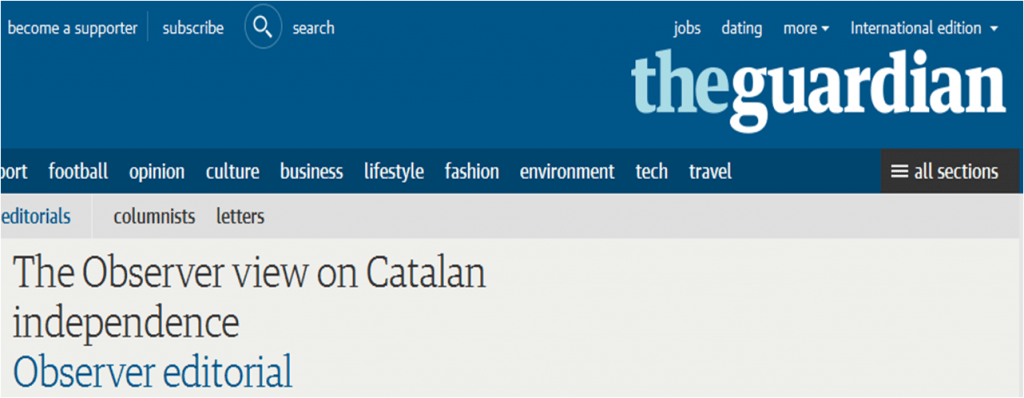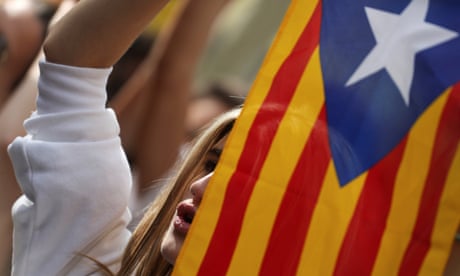Buscar
Últimos temas
Argumentos más vistos
Temas más activos
Visitas
The Guardian a los separatistas: “No sueñen, por favor”- The Observer view on Catalan independence
Página 1 de 1.
 The Guardian a los separatistas: “No sueñen, por favor”- The Observer view on Catalan independence
The Guardian a los separatistas: “No sueñen, por favor”- The Observer view on Catalan independence
The Guardian a los separatistas: “No sueñen, por favor”
MIÉRCOLES, 27 DE SEPTIEMBRE DE 2017 •

21 comentarios
[list=commentlist]
[*]miércoles, 27 de septiembre de 2017 • 23:36
Yo creo que los mossos en su inmensa mayoría harán lo que les ordenen.
Por eso es importante la cúpula, aunque las ordenes si son ilegales se pueden desobedecer.
Si ese escenario de rebeldía del “mosserío” se diera, la cosa no sería una broma, seria rebelión armada (alta traición). Y si se declarara el estado de guerra en Cataluña, desconozco si entrarían en acción los tribunales militares. Cosa muy seria….
[/list]
-----------------------------------------------------------------------------
Catalonia Opinion
The Observer view on Catalan independence
Observer editorial
The ballot is unconsitutional, the confrontations angry and intimidating. But it’s not too late for both sides to start talking sensibly about autonomy

Anti-referendum protest in Barcelona, 22 September 2017. Photograph: Lluis Gene/AFP/Getty Images
Referendums are the blunt instrument of democracy, means that do not always will their expected end. Britain, surveying the inchoate aftermath of Brexit, is learning that the hard way. Catalonia may be about to learn it too.
The independence referendum that the devolved Catalan government intends to hold on 1 Octobercan be portrayed as a cry for freedom from the rule of Madrid by a suppressed nation caged within Spain. That is much, much too simple.
There are historic reasons why many Catalans want to go their own way, reasons rooted in the old kingdoms of Spain, reasons from the years of Franco when their language was banned, as well as supposed financial grievances and a wish for ever greater autonomy. There is also a strand of emotion that, like Brexit, sees salvation in “taking control”.
If all these elements were fused into a single political force with the parliamentary domination of, say, the Scottish National party, there would be a persuasive case for holding an independence ballot, whatever Madrid and Spanish law had to say. But that is not present reality. The agglomeration of very different parties, from bourgeois conservative to leftwing republicans to anti-Europe anti-capitalists (with a touch of anarchy thrown in) commands only a narrow majority in the Barcelona Generalitat. They have little in common but their espousal of this referendum. They are a rickety coalition, just as the administration in Madrid is a queasy minority government. There is frailty, and hectic political calculation, on both sides.
The call of “Catalonia for the Catalans” has an inevitably divisive ring. Catalonia, with its bustling economy, has drawn in outsiders from the rest of Spain and a wider Europe over many decades. It speaks two languages, not one. As Josep Borrell, a Catalan, socialist and former president of the European parliament, explained recently: “Seventy-five per cent of the people whose mother tongue is Catalan support Yes and 75% of the people with other languages as their mother tongue are against independence.”
This region, and would-be country, is profoundly split: by language, by the origins of its population and, if you examine the results map from the last Generalitat elections in 2015, between country and city. The Yes campaigners sought to turn those elections into a crude plebiscite, seeking more than 50% of the vote. They fell short, though with the Trump bonus of winning power without an overall majority of votes. But failure doesn’t dampen ardour like this.

Why do some Catalans want independence and what is Spain's view?
The referendum is, frankly, illegal. The highest courts in the land have ruled it unconstitutional. So the leadership’s threat to stage it regardless and declare independence two days after an assumed triumph at the ballot box is profoundly dangerous. There is, currently, no legal way of holding a vote like this, nor any legitimate preparation for holding it. Only 10% of Spaniards support the referendum. Three-quarters of the parties in the Madrid Cortes renounce it. There is no evidence in Catalonia’s own voting patterns to give it momentum. And yet the pictures of chanting crowds we see on televisions from London to Brussels would seem to argue otherwise.
No one should doubt the Yes campaign’s skill at campaigning, or using the clout of the regional government’s resources, including universities and schools, for PR advantage. But public relations can’t heal a divided region and nor, alas, can Madrid’s fumbling response to the challenge. Arresting some Catalan politicians, threatening more arrests and holding out the possibility of suspending the devolved government may be one response to this crisis. But, at that PR level, it stokes the cynical claim that, even today, Franco equals Spain and Spain equals Franco. Any hint of oppression lite can be used to advantage.
No dreams, please. Secession, in a democratic Spain inside a democratic Europe, has to be pursued calmly and honestly. You can understand the drumbeats of separation, especially in a region where the actual presence of Madrid governance on the ground in country towns and villages is already vestigial. You can also, as with Brexit, feel the tumult of economic disaster 10 years ago still making waves. But civil unrest and wild words promise only more disaster. It is time for both sides to pause and ponder the damage. It’s time to pull back.Unlike the Brexit outcome, Catalonia’s referendum will not pass democratic muster. But, like Brexit, the possibilities after secession have barely been mentioned, let alone examined. One word – Yes – seems enough. Welcome to a new land, flowing with milk and honey. But if the European Union is alarmed about Britain leaving, it is still more alarmed – from Belgium to France to Italy – about separatist movements destroying cohesion from within. And about a Spain, 40 years after democracy returned, lurching into unpredictable confrontation as other regions – the Basque country, Galicia – stage their own UDIs. There is still room for negotiation here. Madrid has already offered talks on autonomy issues. If the Catalan government can demonstrate a consistent demand and produce properly monitored plans for an eventual referendum, perhaps with a higher ceiling than 50.1%, then that is an approach that might heal the wounds – division, anger, increasing intimidation – already opening in society. The prime minister, Mariano Rajoy, for his part, should try to move cautiously, always open to compromise and using his Socialist and Ciudadanos allies as honest brokers, along with strong, clear EU intervention.
… we have a small favour to ask. More people are reading the Guardian than ever but advertising revenues across the media are falling fast. And unlike many news organisations, we haven’t put up a paywall – we want to keep our journalism as open as we can. So you can see why we need to ask for your help. The Guardian’s independent, investigative journalism takes a lot of time, money and hard work to produce. But we do it because we believe our perspective matters – because it might well be your perspective, too.
https://www.theguardian.com/commentisfree/2017/sep/23/observer-view-catalan-referendum-spain
MIÉRCOLES, 27 DE SEPTIEMBRE DE 2017 •
La secesión, en una España democrática dentro de una Europa democrática, no tiene lugar.

Nuevo revés internacional del prusés. The Guardian dice que lo del 1-O no tiene legitimidad, es un disparate y es muy peligroso:
“La votación es inconstitucional, las confrontaciones enfadadas e intimidatorias (…)
Esta región (…) está profudamente dividida: por lengua, por orígenes de su población y, si se examina el mapa de resultados de las últimas elecciones a la Generalitat en 2015, entre campo y ciudad (…)
El referéndum es, francamente, ilegal. Los tribunales lo han declarado inconstitucional. Por lo tanto, la amenaza de los líderes catalanes de organizarlo y declarar la independencia dos días después de un supuesto triunfo en las urnas es profundamente peligrosa.
Actualmente, no existe una forma legal de celebrar una votación como ésta, ni tampoco ninguna preparación legítima para su celebración.
Sólo el 10% de los españoles apoya el referéndum. Tres cuartas partes de los partidos en las Cortes de Madrid lo rechazan. No hay evidencia de que los propios patrones de votación de Cataluña puedan darle impulso (…)
No sueñen, por favor”.
21 comentarios Auvanko
Auvanko
[list=commentlist][*]miércoles, 27 de septiembre de 2017 • 23:36
Yo creo que los mossos en su inmensa mayoría harán lo que les ordenen.
Por eso es importante la cúpula, aunque las ordenes si son ilegales se pueden desobedecer.
Si ese escenario de rebeldía del “mosserío” se diera, la cosa no sería una broma, seria rebelión armada (alta traición). Y si se declarara el estado de guerra en Cataluña, desconozco si entrarían en acción los tribunales militares. Cosa muy seria….
[/list]
-----------------------------------------------------------------------------
Catalonia Opinion
The Observer view on Catalan independence
Observer editorial
The ballot is unconsitutional, the confrontations angry and intimidating. But it’s not too late for both sides to start talking sensibly about autonomy

Anti-referendum protest in Barcelona, 22 September 2017. Photograph: Lluis Gene/AFP/Getty Images
Sunday 24 September 2017 00.05 BST
Referendums are the blunt instrument of democracy, means that do not always will their expected end. Britain, surveying the inchoate aftermath of Brexit, is learning that the hard way. Catalonia may be about to learn it too.
The independence referendum that the devolved Catalan government intends to hold on 1 Octobercan be portrayed as a cry for freedom from the rule of Madrid by a suppressed nation caged within Spain. That is much, much too simple.
There are historic reasons why many Catalans want to go their own way, reasons rooted in the old kingdoms of Spain, reasons from the years of Franco when their language was banned, as well as supposed financial grievances and a wish for ever greater autonomy. There is also a strand of emotion that, like Brexit, sees salvation in “taking control”.
If all these elements were fused into a single political force with the parliamentary domination of, say, the Scottish National party, there would be a persuasive case for holding an independence ballot, whatever Madrid and Spanish law had to say. But that is not present reality. The agglomeration of very different parties, from bourgeois conservative to leftwing republicans to anti-Europe anti-capitalists (with a touch of anarchy thrown in) commands only a narrow majority in the Barcelona Generalitat. They have little in common but their espousal of this referendum. They are a rickety coalition, just as the administration in Madrid is a queasy minority government. There is frailty, and hectic political calculation, on both sides.
The call of “Catalonia for the Catalans” has an inevitably divisive ring. Catalonia, with its bustling economy, has drawn in outsiders from the rest of Spain and a wider Europe over many decades. It speaks two languages, not one. As Josep Borrell, a Catalan, socialist and former president of the European parliament, explained recently: “Seventy-five per cent of the people whose mother tongue is Catalan support Yes and 75% of the people with other languages as their mother tongue are against independence.”
This region, and would-be country, is profoundly split: by language, by the origins of its population and, if you examine the results map from the last Generalitat elections in 2015, between country and city. The Yes campaigners sought to turn those elections into a crude plebiscite, seeking more than 50% of the vote. They fell short, though with the Trump bonus of winning power without an overall majority of votes. But failure doesn’t dampen ardour like this.

Why do some Catalans want independence and what is Spain's view?
The referendum is, frankly, illegal. The highest courts in the land have ruled it unconstitutional. So the leadership’s threat to stage it regardless and declare independence two days after an assumed triumph at the ballot box is profoundly dangerous. There is, currently, no legal way of holding a vote like this, nor any legitimate preparation for holding it. Only 10% of Spaniards support the referendum. Three-quarters of the parties in the Madrid Cortes renounce it. There is no evidence in Catalonia’s own voting patterns to give it momentum. And yet the pictures of chanting crowds we see on televisions from London to Brussels would seem to argue otherwise.
No one should doubt the Yes campaign’s skill at campaigning, or using the clout of the regional government’s resources, including universities and schools, for PR advantage. But public relations can’t heal a divided region and nor, alas, can Madrid’s fumbling response to the challenge. Arresting some Catalan politicians, threatening more arrests and holding out the possibility of suspending the devolved government may be one response to this crisis. But, at that PR level, it stokes the cynical claim that, even today, Franco equals Spain and Spain equals Franco. Any hint of oppression lite can be used to advantage.
No dreams, please. Secession, in a democratic Spain inside a democratic Europe, has to be pursued calmly and honestly. You can understand the drumbeats of separation, especially in a region where the actual presence of Madrid governance on the ground in country towns and villages is already vestigial. You can also, as with Brexit, feel the tumult of economic disaster 10 years ago still making waves. But civil unrest and wild words promise only more disaster. It is time for both sides to pause and ponder the damage. It’s time to pull back.Unlike the Brexit outcome, Catalonia’s referendum will not pass democratic muster. But, like Brexit, the possibilities after secession have barely been mentioned, let alone examined. One word – Yes – seems enough. Welcome to a new land, flowing with milk and honey. But if the European Union is alarmed about Britain leaving, it is still more alarmed – from Belgium to France to Italy – about separatist movements destroying cohesion from within. And about a Spain, 40 years after democracy returned, lurching into unpredictable confrontation as other regions – the Basque country, Galicia – stage their own UDIs. There is still room for negotiation here. Madrid has already offered talks on autonomy issues. If the Catalan government can demonstrate a consistent demand and produce properly monitored plans for an eventual referendum, perhaps with a higher ceiling than 50.1%, then that is an approach that might heal the wounds – division, anger, increasing intimidation – already opening in society. The prime minister, Mariano Rajoy, for his part, should try to move cautiously, always open to compromise and using his Socialist and Ciudadanos allies as honest brokers, along with strong, clear EU intervention.
Since you’re here …
… we have a small favour to ask. More people are reading the Guardian than ever but advertising revenues across the media are falling fast. And unlike many news organisations, we haven’t put up a paywall – we want to keep our journalism as open as we can. So you can see why we need to ask for your help. The Guardian’s independent, investigative journalism takes a lot of time, money and hard work to produce. But we do it because we believe our perspective matters – because it might well be your perspective, too.
https://www.theguardian.com/commentisfree/2017/sep/23/observer-view-catalan-referendum-spain
Thomasine F-R. escribió:I appreciate there not being a paywall: it is more democratic for the media to be available for all and not a commodity to be purchased by a few. I’m happy to make a contribution so others with less means still have access to information.

Dark Inside- Cantidad de envíos : 604
Fecha de inscripción : 14/09/2009
 Temas similares
Temas similares» El referéndum catalán en jaque, los separatistas relanzan sus protestas
» Los separatistas usarán viejos inválidos y niños de pecho como escudos humanos Aumenta la histeria ante el panorama catalán
» (ÚLTIMA HORA): Los socios de Pedro Sánchez votan a favor de la narcodictadura de Maduro en el Parlamento Europeo..Parte del Gobierno se posiciona a favor del narcodictador y de la violencia de Maduro
» La Unió de Mossos per la Constitució estalla y exige estas medidas contra el líder de los Mossos separatistas, ponen en su sitio a Albert Donaire, líder de los Mossos separatistas
» ENTREVISTA COMPLETA de la hija mayor del "Chapo" al diario THE GUARDIAN
» Los separatistas usarán viejos inválidos y niños de pecho como escudos humanos Aumenta la histeria ante el panorama catalán
» (ÚLTIMA HORA): Los socios de Pedro Sánchez votan a favor de la narcodictadura de Maduro en el Parlamento Europeo..Parte del Gobierno se posiciona a favor del narcodictador y de la violencia de Maduro
» La Unió de Mossos per la Constitució estalla y exige estas medidas contra el líder de los Mossos separatistas, ponen en su sitio a Albert Donaire, líder de los Mossos separatistas
» ENTREVISTA COMPLETA de la hija mayor del "Chapo" al diario THE GUARDIAN
Página 1 de 1.
Permisos de este foro:
No puedes responder a temas en este foro.
» El cártel de Los Zetas comenzó a operar en 1999 como un brazo armado del Cártel del Golfo, LA HISTORIA DE LOS ZETAS
» Gadafi, Hussein y Noriega deberían recordarle a Maduro que los tiranos tienen fecha de caducidad
» «Violadores en potencia» versus «putas en potencia»
» El Banco de España de Escrivá se sumará al acoso a Madrid: fiscalizará la política de las autonomías Cuerpo evidencia su enemistad con Escrivá: apenas le apoya en el Congreso y obvia su reforma de pensiones
» El presidente del Gobierno, Pedro Sánchez, ha vuelto a hacer gala de su odio a los ricos.
» Yolanda Díaz ofrece como «trabajo esencial» 120 puestos de deportista a inmigrantes a cambio de papeles
» Illa compra un sistema de espionaje para la unidad de los Mossos que persiguió a los constitucionalistas
» Ayuso pide a los barones del PP que no se sienten con Sánchez si no les llama a «todos juntos»
» La presidenta del Supremo se estrena con un recado para Sánchez: «Respeto al trabajo de los jueces»
» Varapalo del TSJM al fiscal general: admite la querella del novio de Ayuso para investigar la filtración
» CASO BEGOÑA GÓMEZ' Una tertuliana de Intxaurrondo en TVE exige a Sánchez que tome el control de los jueces y medios críticos
» El ICO avala al consultor que salpica a la mujer de Sánchez con otros 225.000 euros por la guerra de Ucrania
» El impresionante progreso de la mujer y el hermano de Pedro Sánchez desde que llega a la Secretaría General del PSOE y, especialmente, al Gobierno
» ¿ Quien manda en la Fiscalia ? pues eso......./// La Fiscalía se opone al juez y solicita el archivo de la causa contra Begoña Gómez